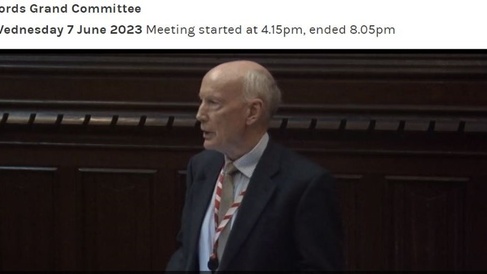
On 7 June 2023, Professor Lord Robert Mair CBE, Founding Head of CSIC at the University of Cambridge, participated in the debate in the House of Lords on the Science and Technology Committee Report: "Science and Technology Superpower - more than a slogan?".
In 2022, the House of Lords Science and Technology Committee conducted an inquiry into the government’s stated ambition to make the UK a “science and technology superpower” by 2030. A particular emphasis during the debate on its report was on the vital need for the UK to associate with Horizon Europe to make sure that the “Science and Technology Superpower” ambition does not remain an “empty slogan”.
It is essential for the UK to associate with Horizon Europe. If it does not do so, the UK is in real danger of losing its prestigious position in the global R&D hierarchy, becoming less attractive as a research partner and for foreign investment and less likely to become a science and technology superpower. Professor Lord Robert Mair, Founding Head of CSIC.
In his speech, Lord Mair supported the Select Committee’s concern about “the damage already caused to the UK’s reputation and scientific capability by the ongoing lack of association with Horizon Europe” and that “if it does not do so, the UK is in real danger of losing its prestigious position in the global R&D hierarchy, becoming less attractive as a research partner and for foreign investment and less likely to become a science and technology superpower”. He also agreed with Baroness Brown of Cambridge and other peers stating that international collaboration is essential for becoming a science superpower. Not participating in Horizon Europe threatens the UK's standing as a country that welcomes the best scientists from around the world and as a desirable partner in international collaborations.
The unanimous call in the debate that the UK should join Horizon Europe without any further delay was clearly expressed in many questions for the Minister, principally to provide clarity about the ongoing negotiations and what is holding up UK association. Viscount Stansgate asked the Minister if he could “at least take back to the Department the near-universal view in this debate that we should join and consider the fact that the Government specifically said after Brexit that this is the one thing that we want to join? Are we still negotiating? Are we doing so in good faith, or are our fingers crossed behind our backs in the hope that plan B is perhaps better?”On the Plan B uncertainty, Lord Bassam of Brighton added, “is there a plan B? Will one be published? Does it exist? Is it something we can rely on?”.
The Ministerial response by Viscount Camrose acknowledged that delays over two years have caused serious and lasting damage to UK R&D and that a resolution is needed as soon as possible. The Minister stated, “To be as clear as I can be, we want to associate with Horizon Europe, but it has to be on fair terms, and if we cannot reach fair and appropriate terms, we will launch Pioneer. Meanwhile, we have established the Horizon guarantee to ensure that there is no loss in funding for the UK sector. This will be in place to cover all Horizon Europe calls that close on or before the end of June 2023. We are keeping the scope of the guarantee under review and will ensure that there is no gap in funding flowing to the sector”.
Lord Mair’s speech also reiterated the important role of catapults in closing “the gap between discovery research and the translation of that research into real-world uses” strongly emphasised in the Nurse review and in the House of Lords’ Science and Technology Select Committee report published in February 2021, entitled Catapults: Bridging the Gap Between Research and Industry. That report recommended that the Government prioritise the scaling up of the Catapult Network, promoting it as the UK’s national innovation asset. Catapults are independent, not-for-profit technology and innovation centres established by the Government in 2011. They are intended to foster collaboration between research organisations in the public and private sectors, and their main purpose is to assist industry in turning innovative research ideas into commercial products via connections and networks. In the light of the ambition for the UK to become a science and technology superpower, Lord Mair asked the Minister to provide an update “on the Government’s strategy regarding catapults and their role in promoting substantially greater industry R&D investment”.
---------------------------------------------
Watch the debate here (Lord Mair’s speech is at 7.12.25pm).
Read the Hansard transcripts of the debate here.
Read more:
House of Lords Library, Science and Technology Committee report: ‘‘Science and technology superpower: More than a slogan?” A summary of the Committee’s findings and the government’s response, 01 June 2023.
House of Lords Science and Technology Committee, Science and technology superpower: More than a slogan?, 4 August 2022, HL Paper 47 of session 2022–23; and Government response, 6 March 2023.
Nurse Review, Independent review of the UK’s research, development and innovation organisational landscape, 6 March 2023.
Department for Science, Innovation and Technology, UK science and technology framework, 6 March 2023.
Department for Science, Innovation and Technology, Research, development and innovation (RDI) organisational landscape: An independent review, 6 March 2023.
Catapult Network: https://catapult.org.uk/news/supercharging-innovation-podcast/.
